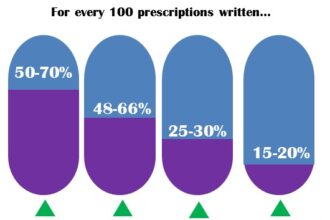Communication missteps between clinicians and patients can lead to big gaps in care. Input from those who know patients best is invaluable for everyone involved in their care. As the director of a New Graduate Nurse Residency Program at an academic medical center in New York, I have the opportunity to teach new nurses listening and other skills that make communication with patients, families, and other health care providers more effective.
Communication missteps between clinicians and patients can lead to big gaps in care. Input from those who know patients best is invaluable for everyone involved in their care. As the director of a New Graduate Nurse Residency Program at an academic medical center in New York, I have the opportunity to teach new nurses listening and other skills that make communication with patients, families, and other health care providers more effective.
We are a large teaching institution affiliated with a number of highly rated medical schools. All new nurses hired by the hospital within 18 months of graduating from nursing school are enrolled in the Residency program.
The program stemmed from the need to remedy new graduate nursing turnover, which in 2010 reached a national average of 27 percent for new nurses. The high turnover is due to the gap between nursing school curriculum and the reality of professional nursing, compounded by the stress of coming into a profession at the bottom of the totem pole. Nurses have to balance putting newly acquired skills into action in the limited time allotted for patient care, medication administration, and charting for a heavy patient load, combined with communication with the care team, patients, and families.
New nurses must adjust to leaving their egos at the door. Teamwork in this age of technology and fast-track medicine is imperative. It’s vital to create an environment of solidarity, with the only brass ring the one of patient improvement and discharge. Doctor–patient communication takes respect, humility, and an open mind. Unfortunately, interprofessional communication is not a required course in many curriculums, and new nurses and residents have to learn to work together on the job. Unless we teach residents and interns empathy as well as technical skills, it’s hard to know where the future of medicine is headed.
It is our duty as those who have a higher vantage point to make health care safer for patients, practitioners, and those who are the future of our industry. Encourage your medical and nursing students to be students of life. Teach each student to be a listener, a care giver, and the one whom patients will remember for the superior quality of care they received.
Some of the overarching lessons I try to impart to my nurse residents: Remember, it might be you or a family member in that hospital bed someday. Think about whom you would want caring for you. Personally, I want nurses who are willing to sit down when they talk to me. I want doctors who look me in the eye, who speak to me with respect and in plain simple language so that I can fully comprehend my illness. I want people who will listen to my thoughts and concerns.
As clinicians, we experience some of the most horrifying, wonderful, sad, happy, and frustrating happenings on a daily basis. Our patients are often frightened and confused, having little prior experience with disease, tragedy, surgery, bells, buzzers, and flashing lights. Many health care workers — nurses, doctors, and students alike — are poking and prodding, taking vital signs and blood samples, and talking to one another while ignoring the one person who has made this teaching moment possible: the patient.
Be clear, be humble, be compassionate — even when you think you don’t have time to be. No matter how much experience you have or how many dues you had to pay along the way, no matter how many letters you have after your name, remember that in this age of “evidence-based practice,” it is no longer necessary to do things the way they’ve always been done. Be a leader and teach by example. Let others see you sitting at the bedside holding a patient’s hand — even when you still have another 45 patients to visit during rounds. Let them hear you speak with respect to a nurse who noticed an order inconsistency.
Be the person you want those around you to model, in terms of your skills, your attitude, and your behavior.








